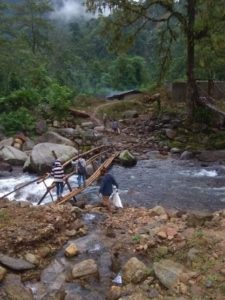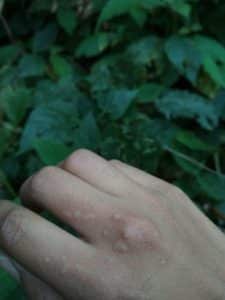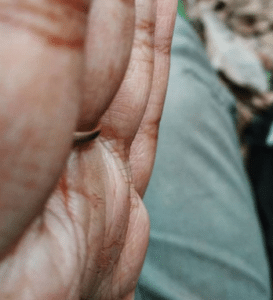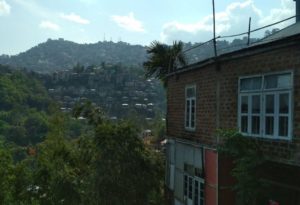The anticipation before exploring a completely different land, without knowing what to expect, is one of the best feelings of conducting field research. For about a year, I have been conducting field sampling in the North East of India. My work involves studying the diversity of true dung beetle species in the region. Having travelled extensively among the vast plains of Tripura and Assam, across the rolling hills of Mizoram and into the remote and challenging terrains of Arunachal Pradesh, I have come to realize that the days you spend in an unknown land, provides many valuable lessons.
The first lesson I learned is that I feel at home in the jungle. In the three months that I worked in the North East of India, I didn’t fall sick in any way. But, every time I would return home to Bangalore City, I would catch the worst flu ever. The irony of feeling more at home in the jungle that is undisturbed and unpolluted, is certainly priceless.

Crossing a stream on our way to our field site
A humorous piece of conviction here: in the last week of field work at Mizoram I completely lost my mind and did something unbelievable. I ate a berry from the forest, and to a taxonomist’s disgust, I did not bother “IDing” the species before carelessly popping it into my mouth. For 12 hours I suffered an itchy throat and felt like there were a million millipedes crawling through my oesophagus. I am thankful I am alive. And I learned that there is a reason why there are many red berries on the forest floor that are uneaten! So, do not blindly eat anything from the wild.
During fieldwork I also got to meet an old friend: the stinging nettle leaf (Urtica sp.). The only other time I have had these boils on my skin was when I had taken long strolls in a forested area behind my father’s ancestral home in Irimbliyam, Kerala. I remember one time that I had ran back home with both my legs covered with large boils that stung like crazy. I later smeared bhasmam (holy ash) on them. And boy, was it cooling. Although, I advise you to wear gloves and appropriate clothing even while wading through a thicket.

Boils due to the stinging nettle leaf
If you are hiking in a bamboo dominated region, in which case you most invariably have to hold the bamboo for support during a climb, be aware. The sheath of bamboo is covered in fine, hairy spikes. These nasty spikes can attack you all at once and poke like needles. You will then need to spend several patient minutes to remove them one by one, unless you have access to water and can wash them off. I get goose bumps every time I look at this picture.

Hairy bamboo sheath spikes, at the top of my palm
Need I say more about the leeches and the ticks? Leeches sucking on your blood is not painful one bit. Tick bites are painful, however, and horrible to get out of your skin. While in Arunachal, I was also excessively bitten by dam dum (Simulium genus) flies. These guys are blood suckers, and their bites can itch for days. Those are my feet and shoes infested with leeches (which were removed before the picture, but notice the blood stains).

Leech bites
Travelling to the remote locations of many states in the North East of India can be physically and mentally challenging. The lack of good infrastructure in terms of well-maintained roads and the undulating terrain at high altitude can provide some discomfort during the journey. In the state of Mizoram, aptly called “the land of the rolling hills”, travelling is a task. However, on reaching Aizawl, the capital city, you will be left awestruck – whether it’s your first or hundredth time. I at once completely forgot about how tired I was, being taken aback by the fact that the entire capital city is jam packed on top of a mountain ridge that is 1000 odd meters above sea level. To get to the grocery or to get yourself a thingpui (tea) at Aizawl, you have to trek or climb a long flight of steps.

Aizawl city (on the hill)
Arranging for accommodation while in the field is another task. Based on past experiences, I prefer staying at the homes of the locals rather than the Inspection Bungalows owned by the Forest Department, only because of the exposure you receive to the local culture, and the healthy food and good friendships.

My colleague and I sharing our field experiences with our hosts
My main lesson is this: the almost impossible terrain, night shifts, difficult accommodations, cramped journeys and tanned skin are absolutely nothing compared to the experiences, knowledge and the bliss one gains from the forest.



